 Dr. Barry Sample, Director of Science and Technology at Quest Diagnostics, is usually busy presenting on workplace drug use trends at industry conferences, fielding interviews with national media outlets or inspecting toxicology laboratories around the world. Yet, his most recent Q&A was via Skype to an audience of fourth and fifth graders gathered in a New York City classroom. Students were excited to talk to a drug testing expert about their recent studies on the impacts of drug use.
Dr. Barry Sample, Director of Science and Technology at Quest Diagnostics, is usually busy presenting on workplace drug use trends at industry conferences, fielding interviews with national media outlets or inspecting toxicology laboratories around the world. Yet, his most recent Q&A was via Skype to an audience of fourth and fifth graders gathered in a New York City classroom. Students were excited to talk to a drug testing expert about their recent studies on the impacts of drug use.
Dr. Sample’s first question was anything but typical. A young man asked, “With cyborgs becoming more prevalent, will this help to reduce future drug use because people will be more robotic?” After a quiet chuckle, Dr. Sample assumed he could be asked almost anything.
Students were prepared in advance with questions on drug consumption, performance-enhancing substances and impaired driving. Hina, another student, inquired about how transportation workers are monitored. Zikui worried about school bus drivers who may overuse caffeine or other legal drugs. In response, Dr. Sample explained the rules and regulations established by the U.S. Department of Transportation (DOT) to screen transportation employees in an effort to keep the public safe.
Other questions focused on ethics and scientific advancements. One student asked what current drug “enhancers” exist to alter how humans function. Another asked if parents should have the right to choose to give IQ or mood boosting drugs to their children. Rahma wanted to know if neurostimulation drugs could be used to improve grades and test scores. And Nicholai asked if physicians should be responsible for any and all drugs and treatments their patients received and how to detect if people took the correct, prescribed medications.
Knowing that Dr. Sample serves as a member of anti-doping committees including running the laboratory that did drug testing for the 1996 Atlanta Olympics, a number of students wondered about athletes testing positive for performance-enhancing drugs, including steroids, and why sports figures would risk their reputations and their careers. Marwa was curious about how to recognize if an athlete is using an illegal substance. Another student wanted to learn more about the measures being used to prevent athletes from using drugs.
Not surprisingly, the students were focused on what Quest Diagnostics is focused on: how to keep people safe, healthy and drug-free. Students inquired about how to stop people from ever taking drugs and how to educate others about the harmful consequences that result from drug use.
Dr. Sample was delighted to share his thoughts with a class that was passionate about science. “Who knows,” Dr. Sample mused, “maybe there was a budding scientist in the class who will one day change the future of drug testing or discover a breakthrough that will help to keep our world safe from drug abuse” – like a drug testing cyborg perhaps.
For more information about drug testing, visit our website.
 Your Privacy Choices
|
Privacy Notices
|
Terms
|
Language Assistance / Non-Discrimination Notice | Asistencia de Idiomas / Aviso de no Discriminación | 語言協助 / 不䈚視通知
Your Privacy Choices
|
Privacy Notices
|
Terms
|
Language Assistance / Non-Discrimination Notice | Asistencia de Idiomas / Aviso de no Discriminación | 語言協助 / 不䈚視通知
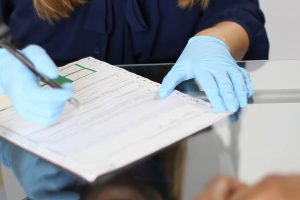

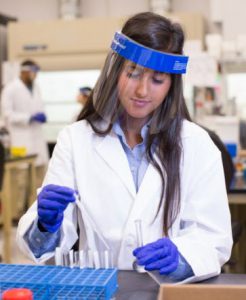


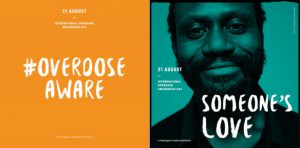
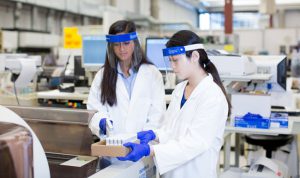



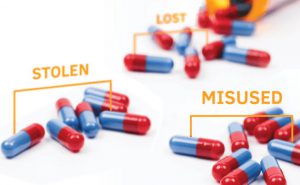


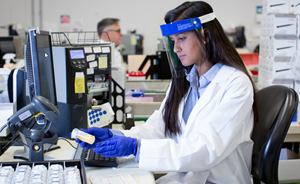





Dr. Sample’s first question was anything but typical. A young man asked, “With cyborgs becoming more prevalent, will this help to reduce future drug use because people will be more robotic?” After a quiet chuckle, Dr. Sample assumed he could be asked almost anything.
Students were prepared in advance with questions on drug consumption, performance-enhancing substances and impaired driving. Hina, another student, inquired about how transportation workers are monitored. Zikui worried about school bus drivers who may overuse caffeine or other legal drugs. In response, Dr. Sample explained the rules and regulations established by the U.S. Department of Transportation (DOT) to screen transportation employees in an effort to keep the public safe.
Other questions focused on ethics and scientific advancements. One student asked what current drug “enhancers” exist to alter how humans function. Another asked if parents should have the right to choose to give IQ or mood boosting drugs to their children. Rahma wanted to know if neurostimulation drugs could be used to improve grades and test scores. And Nicholai asked if physicians should be responsible for any and all drugs and treatments their patients received and how to detect if people took the correct, prescribed medications.
Knowing that Dr. Sample serves as a member of anti-doping committees including running the laboratory that did drug testing for the 1996 Atlanta Olympics, a number of students wondered about athletes testing positive for performance-enhancing drugs, including steroids, and why sports figures would risk their reputations and their careers. Marwa was curious about how to recognize if an athlete is using an illegal substance. Another student wanted to learn more about the measures being used to prevent athletes from using drugs.
Not surprisingly, the students were focused on what Quest Diagnostics is focused on: how to keep people safe, healthy and drug-free. Students inquired about how to stop people from ever taking drugs and how to educate others about the harmful consequences that result from drug use.
Dr. Sample was delighted to share his thoughts with a class that was passionate about science. “Who knows,” Dr. Sample mused, “maybe there was a budding scientist in the class who will one day change the future of drug testing or discover a breakthrough that will help to keep our world safe from drug abuse” – like a drug testing cyborg perhaps.
For more information about drug testing, visit our website.